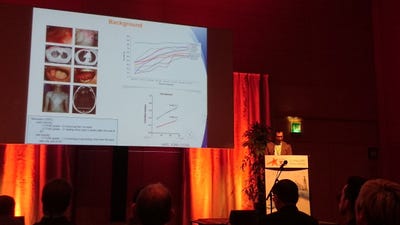Challenge Accepted: French Company Takes On Radiosensitivity
June 7, 2017
Neolys Diagnostics says its kit and lab-based test can detect sensitivity to radiation therapy for cancer patients.
Nancy Crotti

Guillaume Vogin, MD, PhD, of the Institut de Cancérologie de Lorraine in Nancy, France, presented study results supporting Neolys Diagnostics' technology at ESTRO 2017 in Vienna.
From the birthplace of radiation therapy comes a detection kit and lab service to identify patients at risk of developing severe side effects from the cancer treatment.
Gaspare Scaturro, a senior customer solutions consultant at UL, will talk about how to improve your user validation plan at the MD&M East conference and expo, June 13-15, 2017, in New York City. Scaturro is also knowledgeable on FDA's regulations of radiation emitting electronic products, and offers expertise in imaging and therapeutic radiation equipment. |
Lyon, France-based Neolys Diagnostics has developed a kit for use outside of Europe, and a complete test to perform in its laboratory for EU-based patients. The kit and test are designed to characterize patients' radiosensitivity, according to company president Gilles Devillers. The company presented the results of its tests in May at the ESTRO conference in Vienna.
Radiation kills tumor cells by creating DNA double-strand breaks, but can also harm healthy cells surrounding the tumor. The types of severe side effects that may occur with radiation depend upon the body part being treated. For example, radiation to the chest may induce lung fibrosis and heart complications. In general, long-term radiation therapy side effects include secondary cancers and hypothyroidism.
Neolys' understanding of cell signaling and repair mechanisms enable it to characterize the sensitivity of at-risk patients, Devillers told Qmed. Neolys' test has shown specificity of 92% and sensitivity of 100%, he noted.
"As of today, there is no way to know how a human being or his/her tumor will react biologically to radiotherapy," Devillers added. " There (are) only statistical considerations: (i.e.) 80% of ovarian cancer(s) are radiosensitive and 20% are radioresistant; in general, 20% of cancer patients undergoing radiotherapy will experience severe side effects. Knowing how a patient and a tumor will react to radiotherapy helps the oncologist to adapt."
For example, if a prostate cancer patient is determined to be radiosensitive, the oncologist may propose an alternative therapy, such as chemotherapy, surgery, or waiting to see how the cancer will evolve.
Over the past year, Neolys' diagnostics have evolved from providing a binary prediction of radiosensitivity based on a skin biopsy over two days, to the rapid (two-hour) test that can be performed at cancer centers, Devillers said.
The company is running five clinical trials in Europe on head and neck cancer, prostate cancer, pediatric solid cancer, sarcoma, and colorectal cancer. Between 100 and 250 patients will be enrolled per trial. Neolys is also collaborating with labs in North America to prepare further regional trials, Devillers said.
The company's testing service has received the CE Mark, he added. Neolys expects the same for the rapid test in 2018. It is pursuing ISO 15 189 accreditation, and hopes to begin U.S. clinical trials in 2019.
"The rapid test will be licenced out to a strategic partner(s) with global market reach in order to provide an additional premium test to such strategic partner(s)," Devillers concluded. "Neolys Diagnostics will cover the European market need for the service via centralized medical labs and will open regional medical labs outside Europe either itself or via partners."
Nancy Crotti is a contributor to Qmed.
[Image credit: Neolys Diagnostics]
About the Author(s)
You May Also Like

.png?width=300&auto=webp&quality=80&disable=upscale)
